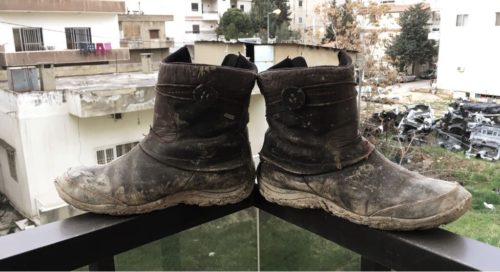Articles
Dirty Boots
This article was written from an interview by the Mission Network News. You can read it here, or you can read it and/or listen to the audio on their website here.
 Lebanon (MNN) — The Syrian refugee camps in Lebanon are dusty part of the year and muddy the rest. It doesn’t matter if gravel is put down, or the fact that tents are on concrete slabs. If you go into a camp, you’re going to come out marked.
“I have this certain pair of boots that I wear to camp that are great. I’ve worn them so much in camp that they, I can’t clean them. I have washed them. I have tried to clean them and it’s just, the dirt’s permeated to them that they just are dirty and I track it everywhere and I go everywhere,” Triumphant Mercy’s *Jessica shares.
“And I’ve noticed that whenever I go into Lebanese stores, the grocery store, the bank, or a restaurant or somewhere with the boots, then Lebanese look down at my feet, they see my dirty boots, and they know that I’ve work in the refugee camps.”
The immediate response—why? Why pour your time into helping Syrian refugees?
Enter the long history between Lebanon and Syria, and the most recent war. There’s deep rooted tension built up on both sides, and it’s caused a division. Lebanon was under Syrian occupation for 29 years.
In 1976, Syria entered Lebanon during the Lebanese civil war. Syria’s presence in the country was meant to be a part of an Arab peacekeeping plan. With that said, things didn’t exactly go as planned. When it was time for Syria to withdraw over a two-year period, the country kept its presence in Lebanon another 15 years. Finally, in 2005 Syria left Lebanon.
http://www.nytimes.com/2005/04/26/international/middleeast/syrian-troops-leave-lebanon-after-29year-occupation.html?mtrref=www.google.com
Fast forward six years to the Syrian civil war in 2011 and the Syrian refugee crisis which quickly followed. Lebanon then faced another Syrian occupation of sorts, this time not by the government, but by hurting people.
Hannah, who lives in Lebanon but works with Syrians, comes face to face with the tensions between the Syrians and Lebanese every day. For some Lebanese, it’s not hard to rationalize that the Syrians are getting what they deserve or they’re getting what they had coming to them. After all, many of them still have their own wounds which need healing.
“Now the Lebanese see foreign NGOs and different countries pouring in resources to the refugees, the Syrians. And that has taken away from the Lebanese economy and for jobs. It has made the poor poorer,” *Jessica explains.
“Because such a huge influx of refugees has come that it’s been a huge burden on Lebanon and whenever foreigners come in and start pouring resources into something that’s been a huge burden on them they see it as so unfair because the Syrians are draining from them…they don’t see it as much as relieving pressure off of them, but kind of adding to the problem I think.”
In fact, when various Lebanese have confronted *Jessica about working with refugees, they’ve told her working with the Syrians isn’t good. If it’s not good, then why do it?
How does one even begin and answer? Where does a response to the “why” questions concerning helping Syrian refugees in Lebanon begin to from? With and through grace.
“I explain to them that each person is valuable…and each person is worthy. That the Syrians are disadvantaged, so many of the kids and so many of the women and so many of the families don’t have an opportunity in life,” *Jessica explains.
“And then I explain to them that I’m a Christian and that Jesus saved me. He saw me as valuable and he poured out his love for me and he saw me as worthy. When I came to that realization it changed everything in my life. And that I can’t see a distinction between people. If Jesus did that for me, then he did that for the Lebanese. And if he did it for the Lebanese, he did it for the Syrians…you can’t take a people group out of that.”
Hannah’s become known by her boots. Now, when she enters the grocer or another place she habitually visits, if she’s not wearing her boots she’s asked, ‘Where are your boots?”
And every time she is asked about her dirty boots, whether they’re on her feet or not, it’s an invitation to share Christ, proclaim that Jesus loves both the Lebanese and the Syrian, and express how each Lebanese and Syrian are worth the price of the cross.
“At the end of the day, I just say, well I think people are worthy to be loved and I think that Jesus loves people. He changed my life. He can change their lives, and I think that they are valuable,” *Jessica shares“But, I also point it back to them and say, if they are valuable and you are valuable too, and you are loved too. And in the same way that I am pouring out my life for them, I would pour out my life for you…my life is to be poured out that the love of Jesus might be known.”
So please, pray for both the Lebanese and the Syrian. Pray for refugees’ eyes to be opened to the Bibles truth, that they’d realized Christ’s love, and that they’d have the courage to walk towards that love and truth.
For many refugees, believing in Christ means every foundation they’ve built their life and values on crumbles. It’s an entire worldview shift and different way of thinking. That gigantic shift can be scary, but then, their lives and values can be built on Christ, the true rock and foundation.
Pray for the relationship between the Lebanese and Syrians, their reconciliation, and for Jesus to enter the hearts of both nations. Ask God to heal the Lebanese and for these same people to come to a place where they can let go of their prejudices towards the Syrian people.
Lebanon (MNN) — The Syrian refugee camps in Lebanon are dusty part of the year and muddy the rest. It doesn’t matter if gravel is put down, or the fact that tents are on concrete slabs. If you go into a camp, you’re going to come out marked.
“I have this certain pair of boots that I wear to camp that are great. I’ve worn them so much in camp that they, I can’t clean them. I have washed them. I have tried to clean them and it’s just, the dirt’s permeated to them that they just are dirty and I track it everywhere and I go everywhere,” Triumphant Mercy’s *Jessica shares.
“And I’ve noticed that whenever I go into Lebanese stores, the grocery store, the bank, or a restaurant or somewhere with the boots, then Lebanese look down at my feet, they see my dirty boots, and they know that I’ve work in the refugee camps.”
The immediate response—why? Why pour your time into helping Syrian refugees?
Enter the long history between Lebanon and Syria, and the most recent war. There’s deep rooted tension built up on both sides, and it’s caused a division. Lebanon was under Syrian occupation for 29 years.
In 1976, Syria entered Lebanon during the Lebanese civil war. Syria’s presence in the country was meant to be a part of an Arab peacekeeping plan. With that said, things didn’t exactly go as planned. When it was time for Syria to withdraw over a two-year period, the country kept its presence in Lebanon another 15 years. Finally, in 2005 Syria left Lebanon.
http://www.nytimes.com/2005/04/26/international/middleeast/syrian-troops-leave-lebanon-after-29year-occupation.html?mtrref=www.google.com
Fast forward six years to the Syrian civil war in 2011 and the Syrian refugee crisis which quickly followed. Lebanon then faced another Syrian occupation of sorts, this time not by the government, but by hurting people.
Hannah, who lives in Lebanon but works with Syrians, comes face to face with the tensions between the Syrians and Lebanese every day. For some Lebanese, it’s not hard to rationalize that the Syrians are getting what they deserve or they’re getting what they had coming to them. After all, many of them still have their own wounds which need healing.
“Now the Lebanese see foreign NGOs and different countries pouring in resources to the refugees, the Syrians. And that has taken away from the Lebanese economy and for jobs. It has made the poor poorer,” *Jessica explains.
“Because such a huge influx of refugees has come that it’s been a huge burden on Lebanon and whenever foreigners come in and start pouring resources into something that’s been a huge burden on them they see it as so unfair because the Syrians are draining from them…they don’t see it as much as relieving pressure off of them, but kind of adding to the problem I think.”
In fact, when various Lebanese have confronted *Jessica about working with refugees, they’ve told her working with the Syrians isn’t good. If it’s not good, then why do it?
How does one even begin and answer? Where does a response to the “why” questions concerning helping Syrian refugees in Lebanon begin to from? With and through grace.
“I explain to them that each person is valuable…and each person is worthy. That the Syrians are disadvantaged, so many of the kids and so many of the women and so many of the families don’t have an opportunity in life,” *Jessica explains.
“And then I explain to them that I’m a Christian and that Jesus saved me. He saw me as valuable and he poured out his love for me and he saw me as worthy. When I came to that realization it changed everything in my life. And that I can’t see a distinction between people. If Jesus did that for me, then he did that for the Lebanese. And if he did it for the Lebanese, he did it for the Syrians…you can’t take a people group out of that.”
Hannah’s become known by her boots. Now, when she enters the grocer or another place she habitually visits, if she’s not wearing her boots she’s asked, ‘Where are your boots?”
And every time she is asked about her dirty boots, whether they’re on her feet or not, it’s an invitation to share Christ, proclaim that Jesus loves both the Lebanese and the Syrian, and express how each Lebanese and Syrian are worth the price of the cross.
“At the end of the day, I just say, well I think people are worthy to be loved and I think that Jesus loves people. He changed my life. He can change their lives, and I think that they are valuable,” *Jessica shares“But, I also point it back to them and say, if they are valuable and you are valuable too, and you are loved too. And in the same way that I am pouring out my life for them, I would pour out my life for you…my life is to be poured out that the love of Jesus might be known.”
So please, pray for both the Lebanese and the Syrian. Pray for refugees’ eyes to be opened to the Bibles truth, that they’d realized Christ’s love, and that they’d have the courage to walk towards that love and truth.
For many refugees, believing in Christ means every foundation they’ve built their life and values on crumbles. It’s an entire worldview shift and different way of thinking. That gigantic shift can be scary, but then, their lives and values can be built on Christ, the true rock and foundation.
Pray for the relationship between the Lebanese and Syrians, their reconciliation, and for Jesus to enter the hearts of both nations. Ask God to heal the Lebanese and for these same people to come to a place where they can let go of their prejudices towards the Syrian people.




